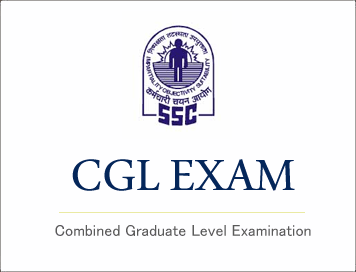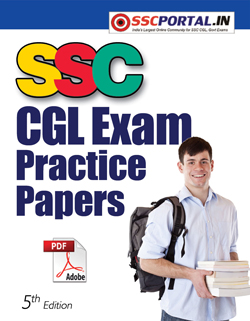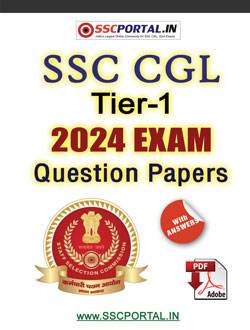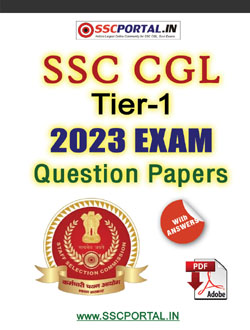NEW! SSC CGL PDF NOTES
Free Mock Test for SSC CGL (Tier-1) Exam 2015 "Test - 2"

Free Mock Test for SSC CGL (Tier-1) Exam 2015
:: GENERAL INTELLIGENCE ::
Directions: From the alternatives, select the set which ismost like the given set.
1. Given set (23, 29, 37)
(a) (17, 21, 29)
(b) (31, 37, 49)
(c) (13, 15, 23)
(d) (41, 47, 53)
2. Given set (8, 48, 64)
(a) (8, 26, 30)
(b) (16, 34, 31)
(c) (12, 24, 36)
(d) (11, 21, 13)
Directions: Which one of the given responses would be a meaningful order of the following words?
4.
(a) Honey
(b) Flower
(c) Bee
(d) Wax
(a) b, a, d, c
(b) b, c, a, d
(c) d, c, b, a
(d) a, c, d, b
5.
(a) Plant
(b) Food
(c) Seed
(d) Leaf
(e) Flower
(a) a,c,d,e,b
(b) c, b, d, e, a
(c) c, a, d, e, b
(d) e, d, c, b, a
6. Which one set of letters when sequentially placed at the gaps in the given letter series shall complete it?
Z X _ T R _ N L J _ F D
(a) V P H B
(b) V R H B
(c) U P J B
(d) U P J D
Directions: From the given responses, find the missing number/date in the series.
7. 10, 100, 200, 310 ?
(a) 400
(b) 410
(c) 420
(d) 430
8. 4/12/95,1/1/96,29/l/96, 26/2/96,?
(a) 24/3/96
(b) 25/3/96
(c) 26/3/96
(d) 27/3/96
:: GENERAL AWARENESS ::
1. Postal voting is otherwise called
(a) plural voting
(b) proxy voting
(c) weighted voting
(d) secret voting
2. Stability of the Government is assured in
(a) Parliamentary Form of Government.
(b) Presidential Form of Government.
(c) Plural Executive System
(d) Direction Democracy
3. According to the Indian Constitution, the vacancy in the office of the President of India shall be filled within
(a) 1 month
(b) 6 months
(c) 3 months
(d) 1 year
4. Who is the Tennis star to become World No. 1 seed at the youngest age?
(a) Stefii Graf
(b) Monica Seles
(c) Chris Evert
(d) Martina Hingis
5. What is “Vishva Mohini”?
(a) Name for India’s Beauty Queen
(b) The title given to Lata Mangeshkar for her contribution to music
(c) An Indian ship
(d) A famous book on Indian dances
6. The main function of the World Trade Organisation (WTO) is
(a) enforcing of Uruguay Round Agreements
(b) facilitating multilateral trade relations of member countries and reviewing
trade policies
(c) administering trade dispute settlement procedures
(d) None of the above
:: ARITHMETIC ::
1. The breadth of a rectangular hall is three-fourths of its length. If the area of the floor is 768 sq. m. then the difference between the length and breadth of the hall is
(a) 8 metres
(b) 12 metres
(c) 24 metres
(d) 32 metres
2. A conical vessle whose internal radius is 12 cm and height 50 cm is full of liquid. The contents are emptied into a cylindrical vessel with radius (internal) 10 cm. The height to which the liquid rises in the cylindrical vessel is
(a) 25cm
(b) 20cm
(c) 24cm
(d) 22cm
3. Two pipes A and B can fill a tank in 20 minutes and 30 minutes respectively. If both pipes are opened together, the time taken to fill the tank is:
(a) 50 minutes
(b) 12 minutes
(c) 25 minutes
(d) 15 minutes
4. If 6 men and 8 boys can do a piece of work in 10 days and 266 men and 48 boys can do the same in 2 days, the time taken by 15 men and 20 boys to do the same type of work will be:
(a) 5 days
(b) 4 days
(c) 6 days
(d) 7 days
5. A train 180 m long moving at the speed of 20 m/sec. over-takes a man moving at a speed of 10m/sec in the same direction. The train passes the man in
(a) 6 sec
(b) 9 sec
(c) 18 sec
(d) 27 sec
6. The distance between two cities A and B is 330 km. A train starts from A at 8 a.m. and travels towards B at 60 km/ hr Another train starts from B at 9 a.m. and travels towards A at 75 km/hr At what time do they meet?
(a) 10 a.m.
(b) 10 : 30 a.m.
(c) 11 a.m.
(d) 11 : 30 a.m.
:: ENGLISH LANGUAGE ::
Directions: Read the following passage carefully and answer the questions
given below it. Certain words have been printed in bold to help you locate
them while answering some of the questions.
Govind’s father was a rich landlord, who was loved and respected by all his tenants. When he died, he left large tracts of land to Govind. But Govind did not spend a single day looking after his land. He had a funny idea, that there existed a magic potion which, if it was poured on any object would turn it into gold. He spent all his time trying to learn about this potion. People took advantage of him and cheated him. His wife grew anxious. Given the amount of money Govind was spending, she was sure that they would soon be paupers.
One day, a widely respected sage who had been to the Himalayas came to their town. Govind asked him about the potion. To his surprise the sage answered, “I have learnt how to brew such a potion. But it is a difficult process.” “Tell me!” insisted Govind, hardly able to believe his luck. “You have to collect the dew which settles on the leaves of a banana tree every morning during winter. There is a condition though. The tree should be planted and
watered regularly with your own hands. Store the collected dew in an earthen vessel and when you have five litres, bring it to me. I will recite a sacred mantra to transform the dew into the potion. A drop of the potion will be sufficient to change any object into gold.”
Govind was worried. “Winter is only for a few months in the year. It will take me years to collect the dew.” “You can plant as many trees as you want,” replied the sage., Govind went home and after talking to his wife, began clearing the large fields which has been lying vacant for years. He planted rows of banana saplings. He tended them with great care. His wife helped him too. She would take the banana crop to market and get a good price. Over the years the plantation grew and finally after six years Govind had five litres of dew. He went to the sage who smiled, uttered a mantra and sprinkled a few drops of dew on a copper vessel. To Govind’s dismay, nothing happened. “You have cheated me!” he shouted at the sage.
The sage, however, smiled. Govind’s wife then came forward with a box. The sage opened it and revealed stacks of gold coins inside. Turning to Govind he said, “You worked hard on your land and created a plantation. Your wife sold the produce in the market. It was your hard work which created this wealth, not magic. If I had told you this earlier, you would not have listened.” Govind understood the wisdom behind the sage’s words and worked even harder from that day on.
1. Why did Govind decide to cultivate a banana crop?
(a) The soil of his land was suitable only for cultivating bananas
(b) It was the most highly priced commodity in the region
(c) It could be grown at any time of the year including winter
(d) The ingredient for the magic potion could only be obtained from a banana
tree.
2. What made Govind angry with the sage?
(a) The sage had conspired with Govind’s wife against him
(b) He had forgotten the magic spell and all Govind’s hard work was in vain
(c) He had lost a good deal of money in cultivating bananas
(d) None of these.
3. How did Govind acquire his dream of gold finally?
(a) The sage gave him gold as a reward for his hard work was in vain
(b) His wife diligently saved the gold he had received from his father
(c) By selling the banana plantation
(d) None of these.
4. Which of the following is TRUE in the context of the passage?
A. Govind was easily fooled by people.
B. Govind was preserving by nature.
C. The sage had never actually been to the Himalayas.
(a) Only A
(b) Both A and B
(c) Only B
(d) Both A and C
5. Why did Govind’s father give him large plots of land?
(a) It was his way of instilling a sense of responsibility in his son
(b) Govind was his only son and sole heir
(c) To provide Govind with sufficient funds to pursue his interest of
discovering a magic potion
(d) He wanted Govind to continue to look after the tenants






